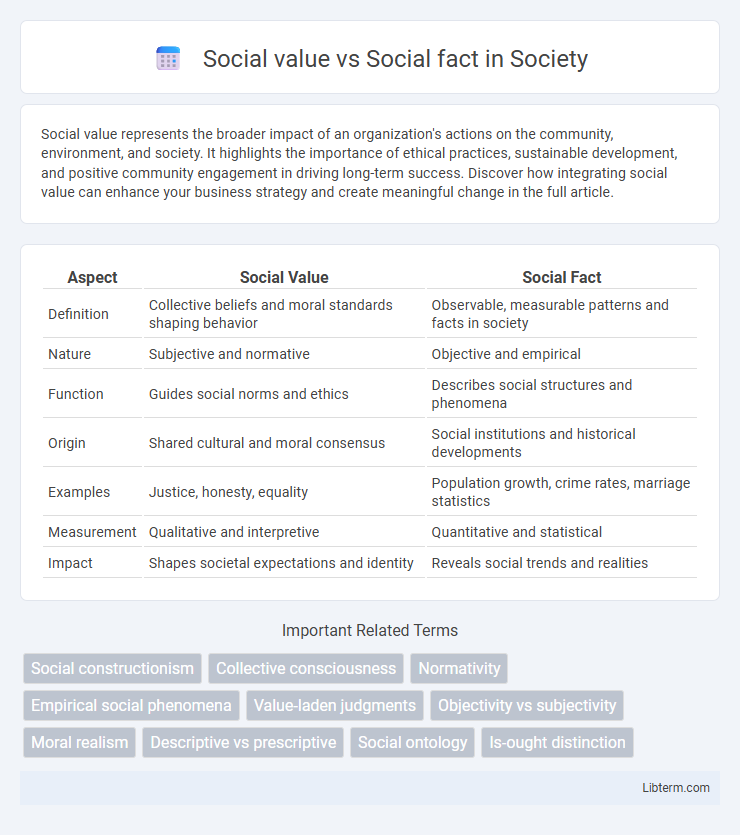Social value represents the broader impact of an organization's actions on the community, environment, and society. It highlights the importance of ethical practices, sustainable development, and positive community engagement in driving long-term success. Discover how integrating social value can enhance your business strategy and create meaningful change in the full article.
Table of Comparison
| Aspect | Social Value | Social Fact |
|---|---|---|
| Definition | Collective beliefs and moral standards shaping behavior | Observable, measurable patterns and facts in society |
| Nature | Subjective and normative | Objective and empirical |
| Function | Guides social norms and ethics | Describes social structures and phenomena |
| Origin | Shared cultural and moral consensus | Social institutions and historical developments |
| Examples | Justice, honesty, equality | Population growth, crime rates, marriage statistics |
| Measurement | Qualitative and interpretive | Quantitative and statistical |
| Impact | Shapes societal expectations and identity | Reveals social trends and realities |
Introduction to Social Value and Social Fact
Social value refers to the collective benefits and shared principles that influence behavior within a community, shaping norms and expectations. Social facts are external, measurable phenomena such as laws, customs, and institutions that exist independently of individual choices but regulate social life. Understanding the distinction between social value as subjective collective ideals and social fact as objective social realities is crucial for analyzing societal structures and dynamics.
Defining Social Value
Social value refers to the tangible and intangible benefits that actions or policies offer to society, encompassing improvements in well-being, social justice, and community cohesion. It differs from social facts, which are objective phenomena or norms external to individuals, as social value emphasizes the meaningful impact perceived by communities and stakeholders. Defining social value requires evaluating outcomes that enhance societal welfare beyond mere economic measures, incorporating cultural and ethical dimensions.
Understanding Social Fact
Social facts are external, collective phenomena that exert influence over individual behavior, such as laws, customs, and institutions, emphasizing their objective existence independent of personal feelings. Understanding social fact involves recognizing these norms as constraints shaping societal actions and maintaining social order across diverse communities. Unlike social values, which are subjective ideals and beliefs held by individuals or groups, social facts possess empirical reality that can be studied scientifically.
Key Differences Between Social Value and Social Fact
Social value refers to individuals' or groups' shared beliefs, norms, and ethical standards guiding behavior, while social fact denotes objective, external societal phenomena that exist independently of individual perceptions. Social values are subjective and culturally constructed, shaping moral judgments and social preferences, whereas social facts are empirical realities like laws, institutions, and social structures that constrain or influence individual actions. Key differences include their nature--normative versus empirical, origin--collective consciousness versus external reality, and function--as guiding principles versus observable patterns within society.
Historical Origins of the Concepts
The distinction between social value and social fact originates from the foundational works of Emile Durkheim, who defined social facts as external, coercive forces that shape individual behavior, independent of personal values. Social values, by contrast, are subjective beliefs held by individuals or groups that influence social norms and ethical standards but lack the objective authority of social facts. This historical differentiation underscores the empirical study of sociology, separating measurable social phenomena from individual or collective value judgments.
Importance in Sociological Analysis
Social value refers to the subjective meanings and cultural norms that individuals and groups attach to behaviors and phenomena, shaping their perceptions and actions. In contrast, social fact represents objective, external social structures and institutions that exist independently of individual choices, such as laws, customs, and social norms. Understanding the interplay between social values and social facts is crucial for sociological analysis, as it enables a comprehensive examination of how subjective meanings influence social behavior within the constraints of objective societal conditions.
Case Studies Illustrating Each Concept
Case studies on social value often highlight community projects where collective benefits like improved well-being or environmental sustainability are measurable, exemplified by urban green space initiatives that increase local quality of life. Social fact case studies typically examine established societal norms and structures, such as Emile Durkheim's research on suicide rates revealing the influence of social regulation on individual behavior. These cases distinguish social value as subjective assessments of societal contributions from social facts as objective, empirically observable social phenomena shaping human actions.
Interplay Between Social Value and Social Fact
Social value and social fact interact dynamically, shaping societal norms and behaviors through collective beliefs and observable realities. Social values provide the normative framework that influences interpretation and significance of social facts, such as patterns of behavior, events, or institutions. This interplay establishes a feedback loop where social facts reinforce or challenge social values, driving social change and continuity.
Impact on Modern Society and Culture
Social value shapes modern society by influencing collective priorities, ethical norms, and cultural behaviors, serving as the foundation for social cohesion and policy-making. Social facts, as external and enduring social realities defined by Emile Durkheim, exert influence by structuring societal institutions and guiding individual actions through established norms and laws. The dynamic interplay between social values and social facts drives cultural evolution and adaptation, impacting social identity, governance, and community development in contemporary contexts.
Conclusion: Implications for Research and Practice
Understanding the distinction between social value and social fact is crucial for accurate sociological research and effective policy-making. Social values represent subjective cultural norms that guide behavior, while social facts are objective, measurable phenomena shaping societal structures. Recognizing their interplay enhances data interpretation, informs ethical decision-making, and improves the design of interventions to address social issues.
Social value Infographic

 libterm.com
libterm.com